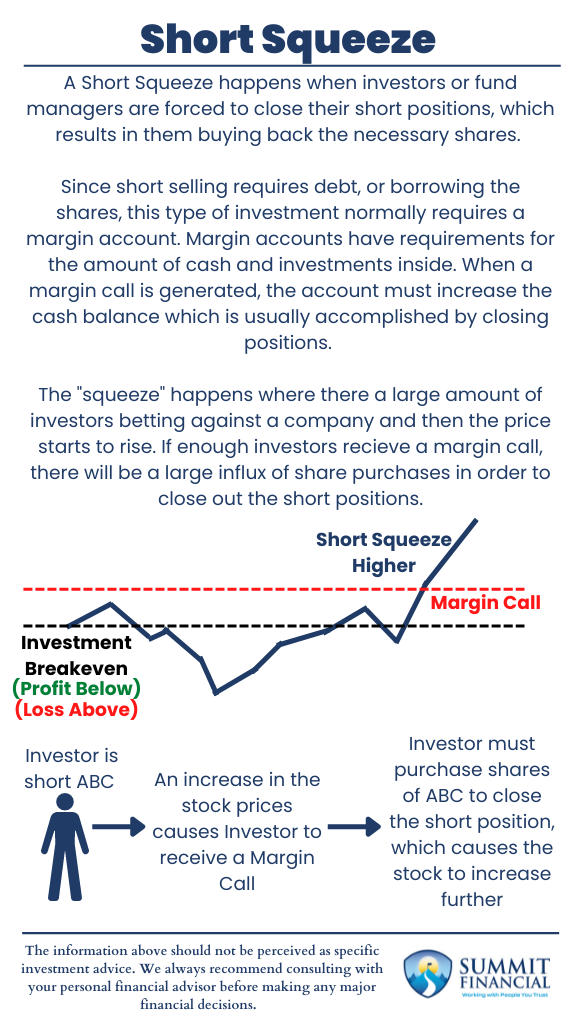The recent news regarding GameStop, AMC, Blackberry, etc. has many individuals wondering, “What exactly is a Short Squeeze?” This blog post will explain from a high-level view what short selling is, what it means to be squeezed, and the major catalysts and results of the recent major events.
The Mechanics of a Short Squeeze
Before we dive into the recent news headlines, we must first cover the process of short selling. Investors and fund managers use short selling to bet against a stock. Normally, when you buy a stock, you make money as the stock price increase. Short selling creates a profit as the price of the stock decreases. To enter a short position, you must borrow the shares first. Then you turn around and sell these shares at the current market price. To close a short position, you must repay the shares that were originally borrowed. This means that you must by the shares at the updated market price and repay the quantity that was borrowed.
For example, if you decide to short XYZ company, you must first borrow the shares. Let us say you borrow 10 shares total. Once you have the shares, you go and sell them at the current market price of $10. You now have 0 shares but $100. If the price falls to $5, you can buyback your 10 shares for only $50. You give back the shares that were borrowed but you get to keep the $50 of profit. If the price were to increase to 15 and you wanted to close your position, you would have to spend $150 to buy the required 10 shares. This would result in a $50 loss.
When Does the Squeeze Happen?
A Short Squeeze happens when investors or fund managers are forced to close their short positions, which results in them buying back the necessary shares. The main reason why investors are forced to close their positions is due to margin requirements. Since short selling requires debt or borrowing the shares, this type of investment normally requires a margin account.
These accounts have specific requirements as it relates to the value of cash and investments within the account. If the values fall too far, the investor is required to generate cash in the account, which is usually accomplished by closing positions. Hedge Fund managers do not typically have the same margin requirements as individual investors, but they still have performance and investment requirements to meet. Hedge Funds need to please their clientele so they will sell to prevent further losses. They often use automatic trades as well that will occur after the position moves a certain dollar amount or a certain percentage.
A short squeeze happens when people are betting against the stock and then the price starts to rise. The price increase creates a loss for the short sellers and then they either want to or are forced to close their positions. By closing, they are buying back the shares, which further increases the stock price. Once this starts, it has the potential to snowball the price upwards depending on the severity of the initial short selling and the level of current buying.
This is what we have been seeing lately in stocks such as GameStop, AMC, BlackBerry, etc. Big Wall Street hedge funds were betting against GameStop at historic levels. A collective group of individuals recognized this and thought it may be an opportunity to make a quick buck. This group of investors used a public forum on Reddit to collectively decide to buy the stock. There was enough interest on this forum that the price of GameStop jumped and began a short squeeze on the hedge funds. Due to the severity of this short squeeze combined with the massive news attention, GameStop has increased an unbelievable amount. It became such a fantastic investment for the Reddit group that they started targeting other companies, cryptocurrencies, and even commodities.

So, What Happens Now?
There have been a variety of social implications from the recent GameStop drama. First, the Reddit page only wanted to make some money, but they have begun to call out the injustice of the hedge fund short selling. By betting against companies, these hedge fund managers are hoping companies go out of business and for people to lose their jobs. Some are claiming short selling is an unethical practice because of this and that it should be prohibited. Also, large brokerage firms, such as Robinhood, froze the buying of these targeted stocks while only allowing the selling of the stocks. Many are claiming this move was considered market manipulation as the brokerage firms seem to have sided with the hedge funds and only allowing the selling of the stocks was an attempt to bring the price lower. No one knows exactly how this controversy will end, but more than likely, it will be settled in the courtroom.
Speak With a Trusted Advisor
If you have any questions about how inflation may affect your investment portfolio, taxes, our 401(k)-recommendation service, or anything else, please call our office at (586) 226-2100.
Please feel free to forward this commentary to a friend, family member, or co-worker. If you have had any changes to your income, job, family, health insurance, risk tolerance, or overall financial situation, please call us so we can discuss it.
We hope you learned something today. If you have any feedback or suggestions, we would love to hear them.
Zachary A. Bachner, CFP®
with contributions from Robert Wink, Kenneth Wink, and James Wink


